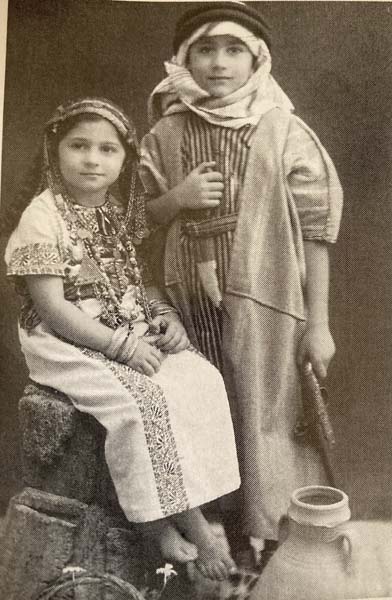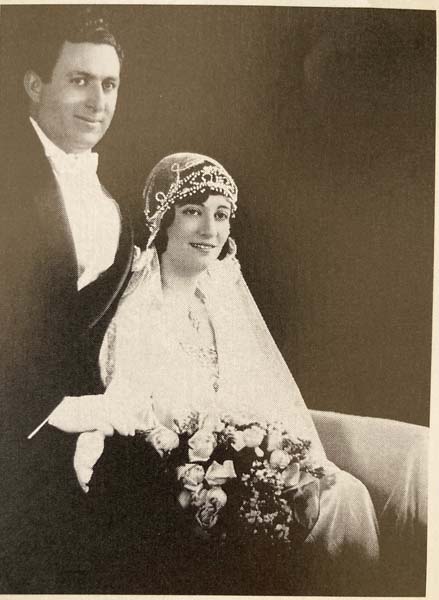From Al-Ahram Weekly archives: Fifty years of dispossession 1948-1998*
Issue: 22 January 1998
There were four prosperous and new Arab quarters largely built during the Mandate period (1918-1948): Upper and Lower Baqaa, Talbiya, and Qatamon. I recall that during my last weeks in the fall of 1947 I had to traverse three of the security zones instituted by the British to get to St. George's School from Talbiya; by December 1947 my parents, sisters, and I had left for Egypt.
My aunt Nabiha and four of her five children stayed on but experienced grave difficulties. The area they lived in was made up of unprepared and unarmed Palestinian families; by February Talibya had been taken over by the Hagganah. Now as we drove around, looking for my family's house, I saw no Arabs, although the handsome old stone houses still bear their Arab identity.
I remembered the house itself quite clearly: two stories, a terraced entrance, a balcony at the front, a palm tree and a large conifer as you climbed toward the front door, a spacious (and at the time) empty square, designated as a park, that lay before the room in which I was born, facing toward the King David and the YMCA. I do not recall street names from that time (there are none, it turns out) although Cousin Yousef (now in Canada) drew me a map from memory that he sent along with a copy of the title deed. Years before, I had heard that Martin Buber lived in the house for a time after 1948, but had died elsewhere. No one seemed to know what became of the house after the middle 1960s.
Our guide for the trip was George Khodr, an elderly gentleman who had been a friend of my father's and an accountant for the family business, the Palestine Educational Company. I vividly recalled the main premises (comprising a wonderful bookshop at which Abba Eban had been a regular customer): These were built against the stretch of city wall running between the Jaffa and New gates.

Edward Said with his sister Rosy in traditional Palestinian dress, Jerusalem, 1941. Source: Out of Place, 1999
All gone now, as we drove past the wall, and up the Mamila Road, then a bustling commercial centre, now a gigantic construction site where a Moshe Safdie settlement was being built. Khodr's family had also lived in Talbiya in a house he took us to so as to orient himself. Despite the Mediterranean foliage one might have been in an elegant Zurich suburb, so patently did Talbiya bespeak its new European personality.
As we walked around, he called of the names of the villas and their original Palestinian owners - Kitaneh, Sununu, Tannous, David, Haramy, Salameh - a sad roll call of the vanished past, for Mariam a reminder of the Palestinian refugees with the very same names who fetched up in Beirut during the fifties and sixties.
It took almost two hours to find the house, ad it is a tribute to my cousin's memory that only by sticking very literally to his map did we finally locate it. Earlier I was detained for half an hour by the oddly familiar contours of Mr. Shamir's unmistakably Arab villa, but abandoned that line of inquiry for the greater certainty of a home on Nahum Sokolow Street, 150 yards away. For there the house was, I suddenly knew, with its still impressive bulk commanding the sandy little square, now an elegant, very manicured park.

The wedding photo of Edward Said’s parents in Nazareth 1932. Source: Out of Place, 1999
My daughter later told me that, using her camera with manic excitement, I reeled off twenty-six photos of the place which, irony of ironies, bore the name plate "International Christian Embassy" at the gate. To have found my family's house now occupied not by an Israeli Jewish family, but by a right-wing Christian fundamentalist and militantly pro-Zionist group (run by a South African Boer, no less, and with a record of unsavory involvement with the Contras to boot), this was an abrupt blow for a child of Palestinian Christian parents.
Anger and melancholy took me over, so that when an American woman came out of the house holding an armful of laundry and asked if she could help, all I could blurt out was an instinctive, "no thanks."
The coincidence was too much for me at that point, suddenly vitalizing my family's history with this astonishing serene likeness of my young father as I really never knew him, and, as I thought back to the silent Talbiya house, with its lamentably foreclosed destiny now in "Christian" hands, that world seemed condemned to intermittent scraps and shards of memory and melancholy. I think I knew at that instant why I should have left politics and resigned from the PNC, as I did, in late 1991, and why I felt I had to return to Palestine just then.
Wasn't it that the shocking medical diagnosis I received in September of a chronically insidious blood disease convinced me for the first time of a mortality I had ignored, and which I now needed to experience with my own family, at the source, so to speak, in Palestine?
And then the reminder of other earlier histories starting and ending in Jerusalem seemed for me a fitting accompaniment to the ebbing of my life on the one hand, and, on the other, a concrete reminder that just as they had started and ended, I did and would too, but so too would my children, who could now see for the first time the linked narrative of our family's generations, where that story belonged but from which it had been banished.
This article was first published in Al-Ahram Weekly’s special pages commemorating 50 years of Al-Nakba, the Palestinian catastrophe when Israel was created on 15 May 1948. These pages, published in 1998, were part of a year-long series of articles documenting the history and nature of the Arab-Israeli struggle, as well as that of Palestinian dispossession and exile.
Short link: